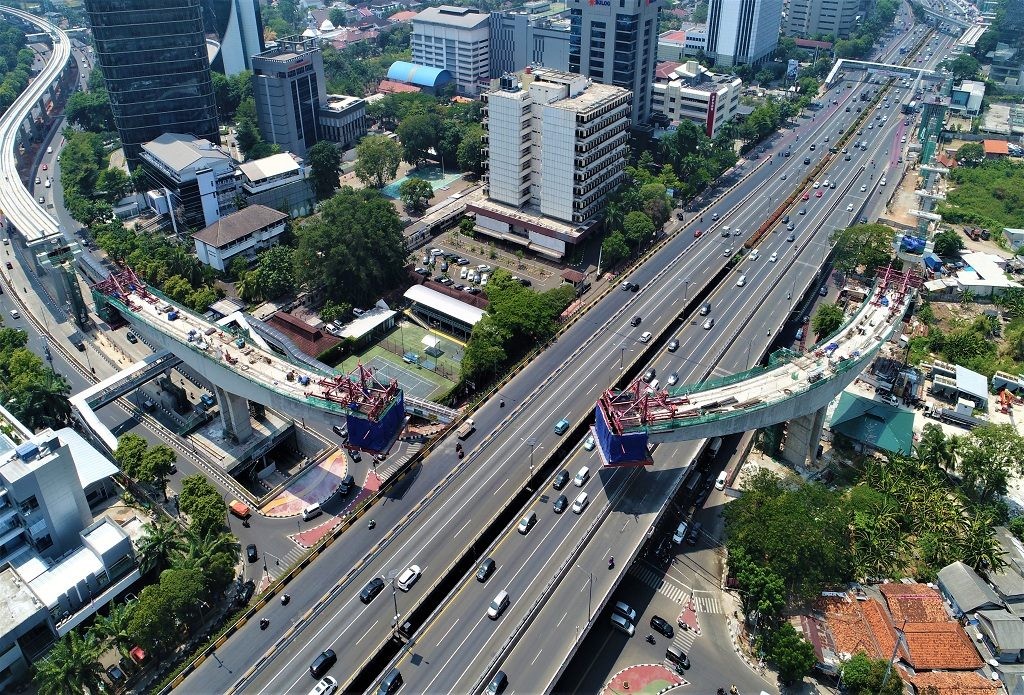Popular Reads
Top Results
Can't find what you're looking for?
View all search resultsPopular Reads
Top Results
Can't find what you're looking for?
View all search resultsRating agencies downgrade Indonesian companies on debt repayment concerns amid COVID-19
The rationale behind the ratings decisions varies for each company but revolves around liquidity risks, concerns over debt repayment ability, a sharp rupiah depreciation, low commodity prices and overall weak demand.
Change text size
Gift Premium Articles
to Anyone
I
nternational rating agencies are questioning Indonesian companies’ ability to repay their debts and have consequently downgraded their ratings and outlooks amid the COVID-19 pandemic.
Moody’s Investor Service has lowered the ratings of property developers PT Agung Podomoro Land and PT Alam Sutera Realty, as well as tire producer PT Gajah Tunggal and coalminer PT Bumi Resources. Fitch Ratings has downgraded private lender PT Bank Central Asia (BCA) and Standard & Poor’s (S&P) has put Alam Sutera on credit watch negative.
Credit rating outlooks on several companies have also been revised to negative, from stable previously. This includes oil and gas firm PT Medco Energi Internasional and textile company PT Pan Brothers by Moody’s and property developers Alam Sutera and PT Lippo Karawaci by Fitch Ratings. S&P has also assigned a negative outlook for poultry firm PT Japfa Comfeed and Medco Energi.
The rationale behind the ratings decisions varies for each company but revolves around liquidity risks, concerns over debt repayment ability, a sharp rupiah depreciation, low commodity prices and overall weak demand.
“The pandemic has disrupted the economy and hit almost every industry there is in Indonesia. It’s no wonder that the rating agencies are casting doubt on the companies’ business processes and their ability to repay their debts,” Anugrah Sekuritas Indonesia fixed income analyst Ramdhan Ario Maruto told The Jakarta Post.
The government has projected economic growth to reach 2.3 percent this year, the lowest in 21 years, or contract by 0.4 percent in the worst-case scenario, as COVID-19 disrupts economic activities. Meanwhile the rupiah is expected to hover between Rp 17,500 and Rp 20,000 per United States dollar under the worst-case scenario as foreign investors dump risky assets, including those of Indonesia.
The situation has forced businesses to close and companies to lay off workers, reducing people’s purchasing power significantly, said Ramdhan.
“People will, for instance, be less likely to buy homes at this time. They are more concerned about fulfilling their own basic needs during times like this rather than buying a house,” he said, explaining the reason behind the property developers’ downgrades.
Given the widespread impact of the pandemic on the overall economy, Ramdhan also warned that the rating downgrades could also extend to Indonesia’s rating as well, just as Fitch and S&P have done for the United Kingdom and China.
Indonesia’s sovereign credit rating from the three top rating agencies currently stands at the lower-end of investment grade, which allows a full range of institutions worldwide to invest in the country’s debt papers. Any downgrade would return the country’s rating to junk, which would result in only selected investors being eligible to invest in the country’s financial assets.
“But as long as the government can maintain the country’s debt-to-GDP ratio at a safe level, I think the rating agencies would at least affirm our ratings even during times of hardship like today,” he said. A new government regulation in lieu of law (Perppu) would allow the state budget deficit-to-GDP ratio to surpass the previous legal limit of 3 percent as President Joko “Jokowi” Widodo expects the budget deficit to reach 5.07 percent of GDP, although government debt-to-GDP would be maintained at 60 percent.
For the private sector, the sharp depreciation of the rupiah, Asia's worst performing currency so far this year, will lead to a spike in debt repayment costs, at a time when demand has been severely hit by the government’s large-scale social restrictions and public health emergency measures.
Read also: Indonesia braces for recession, activates crisis protocol
Moody’s cited heightening risks over liquidity and ability to repay debts as the primary concerns for Agung Podomoro’s and Alam Sutera’s ratings, while Gajah Tunggal was downgraded because of the company’s lack of mitigation amid the sharp rupiah depreciation that could affect the company’s financial performance.
“If sustained, [the rupiah’s depreciation] will drive up debt and weaken earnings before interest, depreciation and amortization [EBITDA] margins,” Moody’s analyst Stephanie Cheong said in a statement on March 31.
Moody’s senior vice president Vikas Halan said on March 23 that it was revising Medco’s outlook to negative as it expected the firm’s credit profile to deteriorate if oil prices remain low for a prolonged period.
Pan Brothers’ outlook was also changed to negative as concerns grow over the company’s ability to refinance its loan that falls due on February 2021, given the challenging credit conditions and heightened global and regional turbulence.
Meanwhile, Fitch Ratings lowered BCA’s rating to BBB- from BBB with a stable outlook: “The downgrades reflect Fitch’s view of the weaker operating environment for Indonesia’s banks as a result of the COVID-19 pandemic,” it wrote in a statement on March 24. Such conditions could put pressure on the bank’s asset quality and reduce profitability as a result of higher provisioning, the statement states.
The pandemic is also the basis of Fitch’s decision to revise its outlook on Lippo Karawaci, which will have difficulty improving cash flow or launching new projects this year amid the challenging circumstances.
S&P’s decision to put Alam Sutra on credit watch negative means the agency could downgrade the company’s rating over concerns of slower-than-expected refinancing efforts on its US$175 million notes due in April 2021.










